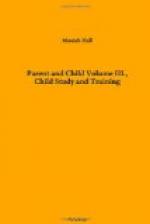This slowness of development, or prolonged infancy as it is called, is of vast significance to the child. It marks at once the chief distinction between the human infant and the young of all other animals. It makes possible a long period of adjustment and training which otherwise would be impossible. Most animals are born with a nervous system highly developed and with most of the adjustment to the environment ready made, so that after a short time all the activities of life are perfected and thereafter automatic action and instinct rule their lives. Because of this lack of infancy and absence of plasticity of the nervous system, animals are little more than machines that perform their task with unvarying regularity in response to outside stimulations. Animals, therefore, are unable to adjust themselves to a change in environment, and as a result their lives are in constant danger. In fact, countless millions of the lower forms of life are perishing every hour because of the lack of possibility of adjustment.
The child, on the other hand, has an extremely long period of infancy, and as a result, the nervous system is so plastic that it may be moulded, fashioned and developed in almost any manner or direction, according to the will of parents and the nature of the environment. The child, consequently, may be educated. By education we mean the training and developing of desirable instincts and capacities and the inhibiting of undesirable ones so that the child may be able constantly to adjust himself to an ever-changing environment.
Fiske, in “The Meaning of Infancy,” Chapter 1, says: “The bird known as the fly-catcher no sooner breaks the egg than it will snap at and catch a fly. This action is not very simple, but because it is something the bird is always doing, being indeed one of the very few things that this bird ever does, the nervous connections needful for doing it are all established before birth, and nothing but the presence of the fly is required to set the operation going. With such creatures as the codfish, the turtle, or the fly-catcher, there is nothing that can properly be called infancy. With them, the sphere of education is extremely limited. They get their education before they are born. In other words, heredity does everything for them, education nothing.
“All mammals and most birds have a period of babyhood that is not very long, but it is on the whole longer with the most intelligent creatures. The period of helpfulness is a period of plasticity. The creature’s career is no longer exclusively determined by heredity. There is a period after birth when its character can be slightly modified by what happens to it after birth, that is, by its experience as an individual. It is no longer necessary for each generation to be exactly like that which has preceded. The door is opened through which the capacity for progress can enter. Horses and dogs, bears and elephants, parrots and monkeys, are all teachable to some extent, and we have even heard of a learned pig, and of learned asses there has been no lack in the world.




